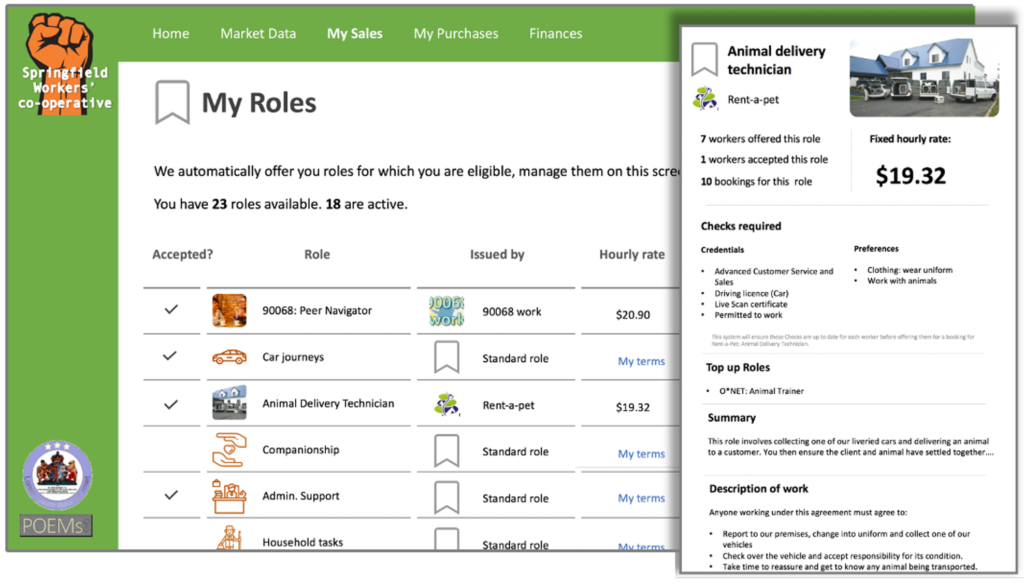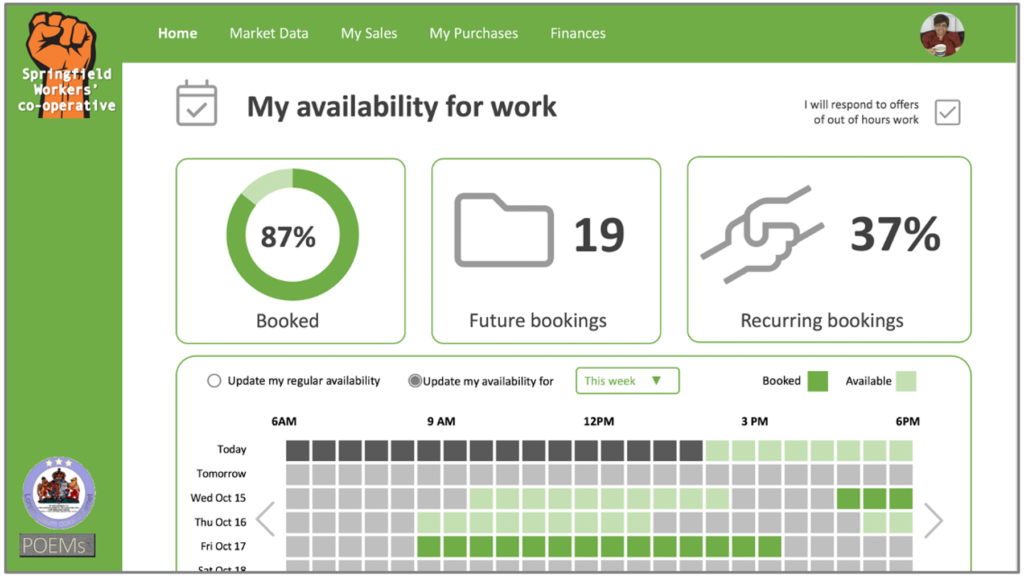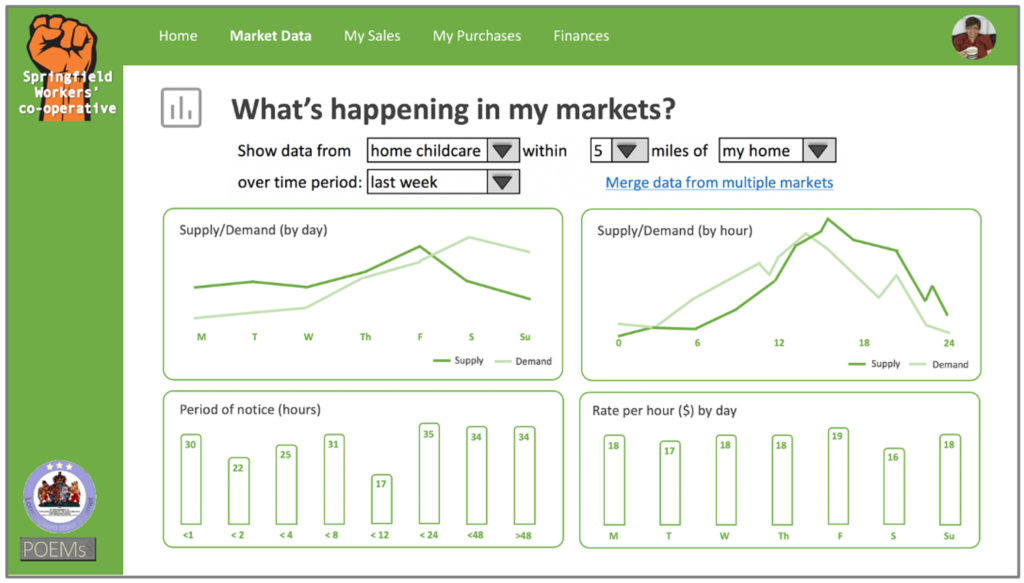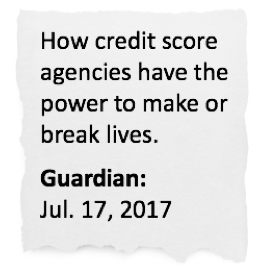 It’s Monday afternoon. Yvonne is in pursuit of diverse economic opportunity. But it must fit within ever-changing commitments in her life.
It’s Monday afternoon. Yvonne is in pursuit of diverse economic opportunity. But it must fit within ever-changing commitments in her life.
Working it
Yvonne is ex-military. She now combines work largely as a security guard (which pays well for veterans), beautician (which she enjoys), and care worker (a first step towards the nursing career she craves). With her new boyfriend, she cares part time for a disabled grandson.
Yvonne lives within a cluster of US states that initiated POEMs (Public Official E-Markets) and saw it quickly adopted by residents. She found the system daunting at first and embraced it conservatively, choosing to have an intermediary as her legal employer for work through the system. She could have opted for a commercial agency active on POEMs, but selected a local co-operative that takes a small cut of her earnings across the system in return for its support. This charge is on top of POEMs’ 2% markup on each transaction.
 A supermarket offers Guaranteed Work to veterans. If she listed a minimum 16 hours availability a week they would buy at least 8 whenever local stores were busy. Realizing the value of a good track record, she worked diligently; qualifying for their training. Completion came with a code allowing her to validate the new credential and add it to her list of achievements in POEMs.
A supermarket offers Guaranteed Work to veterans. If she listed a minimum 16 hours availability a week they would buy at least 8 whenever local stores were busy. Realizing the value of a good track record, she worked diligently; qualifying for their training. Completion came with a code allowing her to validate the new credential and add it to her list of achievements in POEMs.
Knowing she wants beauty work, POEMs next suggested her to a salon seeking a pool of top-up receptionists. Local shortages of beauticians soon triggered external investment for certification as a manicurist in return for a cut of her enhanced earnings.
Other enthusiasms are constantly being exploited as POEMs works to uplift Yvonne’s hours and earnings. One example: Military and retail experience, plus a self-certified love of dogs, ensured she was found by POEMs’ algorithms working for Rent-A-Pet Inc. The company sought local delivery drivers for their hire of comfort dogs through POEMs. They have told POEMs to arrange one of their approved drivers, and a delivery vehicle, within each rental.

Yvonne has now turned off her old retail worktypes. They don’t pay enough and weren’t taking her where she wants to go. If the market slackens, she can of course switch them back on.
Being available
Yvonne now trades many assets on POEMs. She rents out a set of holiday ornaments, the grandson’s tent, a foot spa, and an evening gown when they’re not needed. All the work is done for her by a nearby “holder” who dispatches items for rentals and checks them back in. POEMs constructs a contractual chain for each transaction, deducting the holder’s charges.
But the key asset is hours she is available for work. She has a recurring pattern of availability in POEMs, but updates it as daily life unfolds. And her calendar is partly filled with recurring bookings; slots where a business or household wants her at regular times each week. POEMs constantly incentivizes these steps towards an employer/employee relationship.

Utilization is a key metric in POEMs; what percentage of hours offered are booked? Yvonne’s 87% is personal, covering her last four weeks. But utilization can also be shown broadly; across types of work, geographies, worker attributes, or combinations of factors. (“What was the utilization of Spanish-speaking manicurists within 10 miles of my home last week?”)
Yvonne has told the system how far she will travel from home, her minimum period of notice, and minimum length of bookings. Where she hasn’t accepted a fixed pay rate offer, she can tell POEMs to dynamically construct her rate for any booking for which she’s eligible. The further she has to travel the more compensation she demands. And she will only do short-notice assignments for an extra $2 for each hour less than four hours’ notice. This is a wide market with competing buyers. She charges what she’s worth.
POEMs doesn’t broadcast out potential bookings with sellers scrabbling to respond. It treats Yvonne’s hours as an asset to be sold at maximized value, within her parameters, and to be constantly developed. Whenever she gets a booking it will be within all her rules, at times she wants to work, helping her along her chosen pathway. The system expects her to complete these bookings. Her valuable track record of reliability is on the line if she confirms an assignment then fails to show up without triggering a replacement by POEMs.
Initial videos showing a version of the markets Yvonne is using can be seen here.
Data day
Many POEMs users are passive. They define an ambition, a career in marine engineering for example, then let system algorithms plot personalized stepping-stones of bookings, up-skilling, and investment, or other interventions to get them there. But Yvonne is more hands-on. She assesses POEMs’ information outputs the way amateur investors scrutinize stock tickers. Today’s potential strategy: Should she add babysitting to her portfolio of work-types? She tells Alexa to put the relevant POEMs, data on her TV.

Currently there are no offers to finance her certification for childcare. That suggests a market that’s over-supplied. Does she believe she could attract buyers in a crowded sector? If so, POEMs can align her with trainers and certifying authorities instantly. It will construct learning sessions at times that fit around her. But she will have to self-fund her accreditation.
So where is there funding if she wants to further broaden her possibilities? POEMs offers her an Opportunity Feed, curated through her filters, refreshed as often as she likes. She flicks it up on her phone. Today it is offering her:
 Investment in her development: Arondique Inc. have put $50,000 into POEMs and told it to identify qualified beauticians with strong reliability records and medical experience or aspirations. They must be spread around the system’s catchment area. The corporate will fund individualized training in how to administer cosmetic facial injections in customers’ homes. POEMs is flagging the catch in the offer; she must agree to only injecting Arondique products for a year after training. POEMs would enforce this when she is booked for injections. The pay rate is acceptable to her, but utilization for their agents is only 48%.
Investment in her development: Arondique Inc. have put $50,000 into POEMs and told it to identify qualified beauticians with strong reliability records and medical experience or aspirations. They must be spread around the system’s catchment area. The corporate will fund individualized training in how to administer cosmetic facial injections in customers’ homes. POEMs is flagging the catch in the offer; she must agree to only injecting Arondique products for a year after training. POEMs would enforce this when she is booked for injections. The pay rate is acceptable to her, but utilization for their agents is only 48%.
She swipes left on this one.
- Buyers of her time: Countless organizations tell POEMs to find workers with specific combinations of geography, skills, reliability ranking, and aspirations. A local residential care facility maintains a pool of approved workers on the platform. Each worker in the pool has agreed to the facility’s fixed pay rate, and been inducted by their staff. Yvonne is already in over a dozen pools like this for employers wanting pre-trained top-up workers on-tap. She likes working where they know her. She swipes right. That tells POEMs to schedule an induction session within the hours she makes herself available.
- The job interview is an instant swipe left. It lacks the prefix “Paid”. Given Yvonne’s track record, she expects any serious employer trying to tempt her out of POEMs to pay for her time at an interview. She isn’t in supplicant mode.
- Benefits: POEMs offered Yvonne an array of models – and providers – for health, holiday, retirement, and other benefits each pro-rated and deducted from payment for each hour worked. Her system settings tell POEMs to alert her when more favorable options emerge from a new provider. She could have better pay if sick, it only takes a right swipe.
- Social opportunities: Working in a post-jobs world can be isolating. POEMs has a range of social network tools. That’s tools for actual relevant local networking. POEMs’ operators have no algorithms that keep Yvonne glued to a screen, consuming adverts. Their priority is finding her as much well-paid work as possible, the operators get – perhaps – 2% of users’ earnings with no other source of revenue. Real networks keep her motivated. In this case, a local security guard wants to arrange meet ups with other women in the sector; she has told POEMs to reach out to peers. Yvonne taps to open up details, then tells the system to push the opportunity back to her in a month. She can’t decide now.
Money ways
Yvonne manages household finances through POEMs. She “auto-balances” income, automatically lending out anything over $50 above weekly spends each day, sometimes borrowing to make her target figure another week. This market for small loans between POEMs users is solid. POEMs isn’t allowed to speculate or create money by re-lending deposits. It just lets lenders choose one of its funds based on the risk parameters of users allowed to borrow that money. Market forces set interest rates for each pot of digital cash with the system securely facilitating every withdrawal for its standard 2% cut.
Staying cautious, Yvonne siphons, spare income to a fund lending to people who have reached at least level 5 (of 6) in POEMs’ reliability ranking. Borrowers must accept they will go down two ranks across all POEMs’ markets if they fail to repay. Anyone likely to default in this’ market for high-reliability individuals can of course re-borrow from another fund for less proven users. But rates will be higher to attract lenders willing to take more risk.
 Yvonne started in POEMs with few assets. Her track record of reliable low-level work has become collateral even for the wider world. Unable to afford a deposit on her rent, she bought a POEMs’ bond to email to her landlord.
Yvonne started in POEMs with few assets. Her track record of reliable low-level work has become collateral even for the wider world. Unable to afford a deposit on her rent, she bought a POEMs’ bond to email to her landlord.
Competing insurers inside the system allow a POEMs track record to be pledged for a cash bond. If she stops paying rent without cause the insurers pay the landlord, but she loses her track record and has to start again on the first rung.
POEMs never forces her to do anything, it just monitors whether she does what she says she will (by confirming, then completing bookings) and allows her to exploit the resulting record. Outside POEMs, credit ratings rank individuals by ability to consume. Yvonne is judged on ability to deliver.
Embedded
Within 6 months, POEMs has become a taken-for-granted enabler for Yvonne and her family. Her teenage stepson is in a school that operates a “Ringfenced Market”. Teachers have identified 50 local households and businesses they deem fit to hire 16 year olds for a few hours at a time. On Saturday daytimes, when they wish, he and classmates are deployed in stocktaking, lawn care, bike repair, cleaning, bagging at a food market, teaching younger kids soccer, bike maintenance, data entry, counter service, and other low risk activities.
Monthly review of each student’s experience with a Business Studies tutor helps them expand skills, services, and confidence. All activity is limited to the school’s approved buyers, within times and parameters set by the Principal. On graduation, the teen will transition from this protective sub-market to mainstream POEMs with hundreds of hours of earning from several buyers. That will kick-start his track record in the wider world. He aspires to life as a hotel manager. Once in community college, he will tell POEMs to find him paid work in banqueting, front-desk, portering, and similar functions at times that fit round his studies.
Yvonne is now heading out to a booking from one of her favored clients. On the way she calls her sister, living in a neighboring state that didn’t initiate POEMs. There’s a predictable lament; daily scrabbling for survival work, low wages, payday loans, listless children with few prospects, and a lack of decent men for dating.
 POEMs has removed even the last concern for Yvonne. She met her partner in an app that allows users to pledge their system trading record. She would only meet suitors whose photo, life story, and reliability in making arrangements to meet was backed by pledging their POEMs’ reliability ranking to its truthfulness.
POEMs has removed even the last concern for Yvonne. She met her partner in an app that allows users to pledge their system trading record. She would only meet suitors whose photo, life story, and reliability in making arrangements to meet was backed by pledging their POEMs’ reliability ranking to its truthfulness.
If she had found a guy lying, or letting her down without excuse, on a first date, she could refer it into POEMs’ dispute resolution tools. After mediation, he could have found himself back down the ladder of grades. She would have done it to protect other women.
